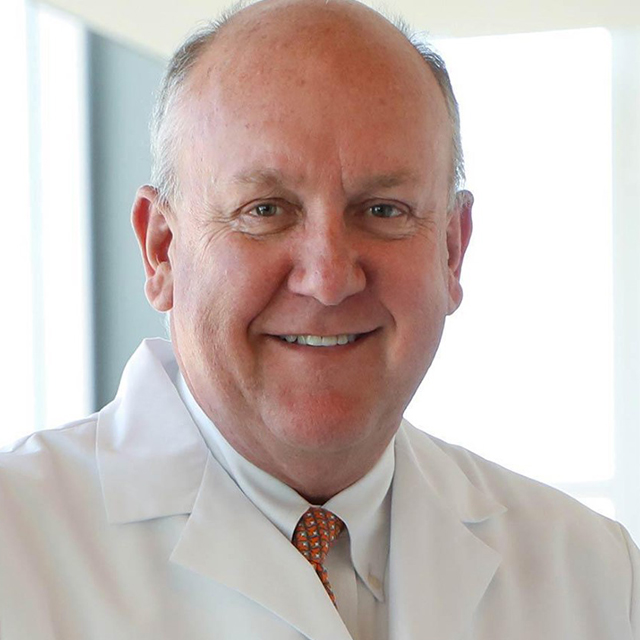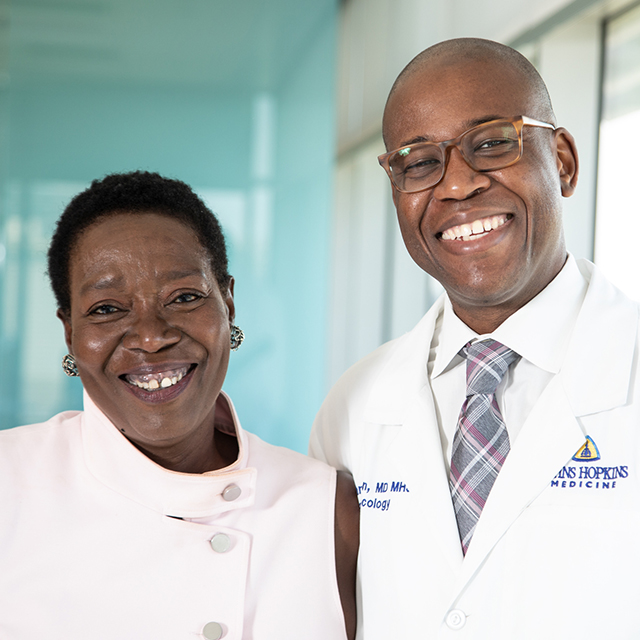From left, back row, Rosemary Gluck Pozefsky, Thomas Pozefsky, Darius Johnson (2019–2020 scholar), Dorry Segev (second recipient of Pozefsky Professorship) and Macey Levan, core faculty member, Epidemiology Research Group in Organ Transplantation. Center, Luckmini Liyanage (2018–2019 scholar). (File photo, Sept. 2019)
When ceramic artist Margery Pozefsky needed a kidney transplant in 2000, her husband, Thomas, a Johns Hopkins internist and endocrinologist, was eager to donate one. But his kidneys didn’t match hers. Fortunately, their son’s did, and the transplant proved successful.
But Margery was troubled to learn that others in need of a kidney often wait years for a match. “Margie wondered aloud to me and the transplant team,” recalls Thomas, “‘Why isn’t swapping possible?’” She went on to suggest that if someone wants to donate a kidney to a loved one and it isn’t a good match, but the kidney matches with another person, why not exchange kidneys?
The rest is history: Bolstered by funding from the Pozefsky family, the Johns Hopkins Comprehensive Transplant Center (CTC) pioneered a program that matches potential donor-recipient pairs nationally for kidney exchanges, called kidney paired donation (KPD). Sadly, Margery Pozefsky died in 2012, but her legacy endures.
Johns Hopkins surgeons performed one of the world’s first KPD triple transplants in 2001, and the first triple domino transplant in 2005. The procedure involves bringing together a group of incompatible donor-recipient pairs (people with a willing donor who is not compatible by blood or tissue) and matching them with other pairs in the same predicament for simultaneous transplants.
Not long after Margery’s surgery, the Pozefskys provided funding to launch the Incompatible Kidney Transplant Program, paving the way for the KPD program and database, and leading to the first five-way domino kidney transplant in 2006. Two years later, the Pozefskys endowed the Margery K. and Thomas Pozefsky Professorship in Kidney Transplant Surgery. The first recipient was then CTC director Robert Montgomery, M.D.
Recently, Robert Higgins, M.D., director of the Department of Surgery, announced the second recipient of the professorship: Dorry Segev, M.D., Ph.D., associate vice chair for research and professor of surgery. Segev was the first person in the U.S. to demonstrate the survival benefit of incompatible kidney transplantation. He’s also credited with orchestrating the country’s first HIV-to-HIV transplant, and he leads the Epidemiology Research G\roup in Organ Transplantation (ERGOT) — “the largest and most prolific group of its kind in the world,” he says.
Eager to show his gratitude for Margery’s care, in 2018, Thomas Pozefsky launched the Pozefsky Scholars Program to support Johns Hopkins medical students in the ERGOT lab. “I wanted an important project and learned that it’s hard for trainees doing research to secure funding for their projects,” he says.
For Pozefsky, who remarried in 2016, interactions with the students have brought unexpected rewards. “We talk about their work and see progress in matching kidney donors and recipients,” he says. “It’s given me a sense of personal accomplishment. I’m helping the school, the science and the students, as well as the kidney recipients — something I’m very proud of.”
For Segev, the most gratifying aspect of this experience has been “the collaborative spirit” behind the Pozefsky Professorship and Scholars Program. “The personal engagement spurs ideas and inspires trainees, who are writing grants that will impact the science directly and their work personally.”
To support this program, visit bit.ly/surgerygift.



